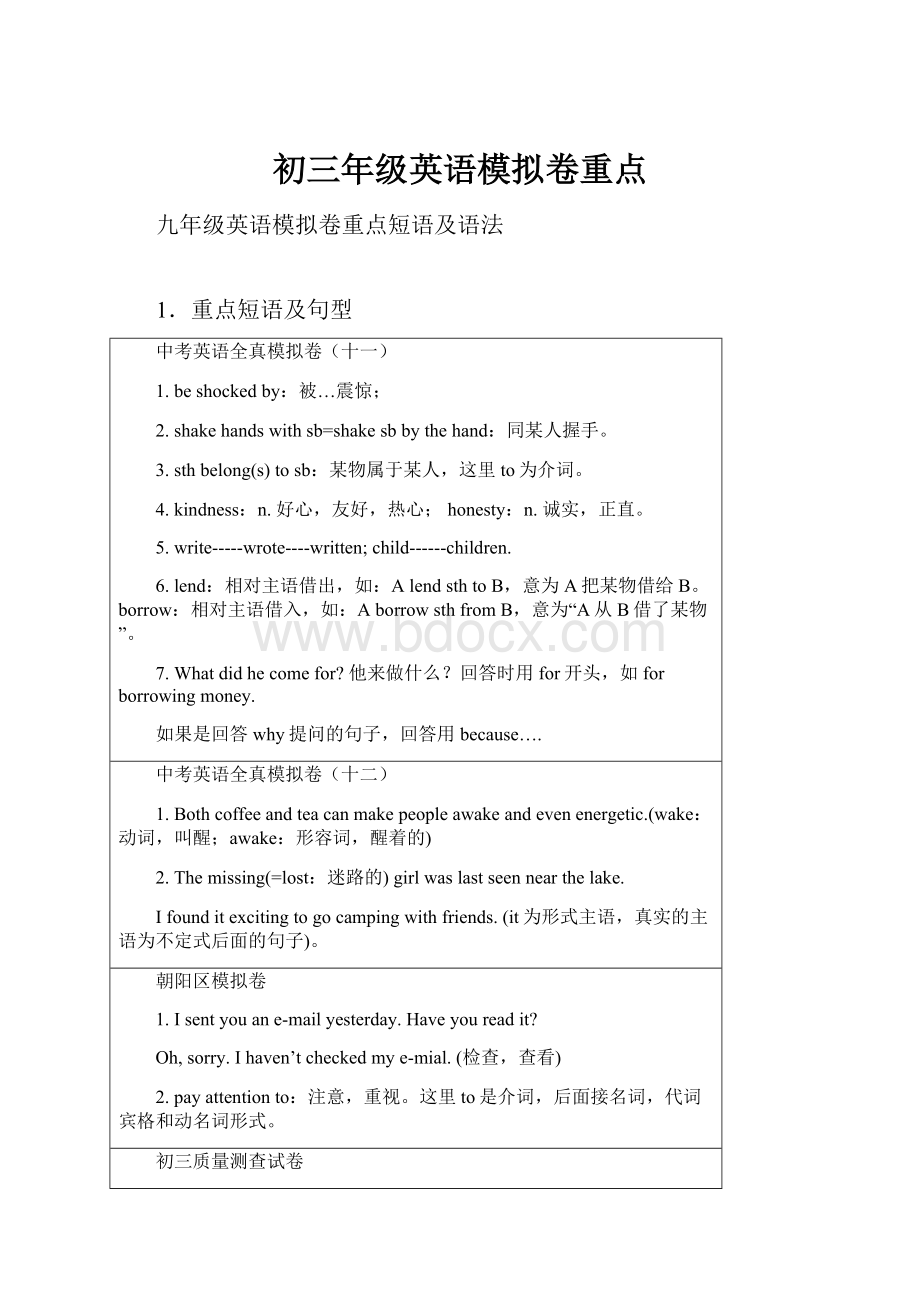初三年级英语模拟卷重点.docx
《初三年级英语模拟卷重点.docx》由会员分享,可在线阅读,更多相关《初三年级英语模拟卷重点.docx(28页珍藏版)》请在冰豆网上搜索。

初三年级英语模拟卷重点
九年级英语模拟卷重点短语及语法
1.重点短语及句型
中考英语全真模拟卷(十一)
1.beshockedby:
被…震惊;
2.shakehandswithsb=shakesbbythehand:
同某人握手。
3.sthbelong(s)tosb:
某物属于某人,这里to为介词。
4.kindness:
n.好心,友好,热心;honesty:
n.诚实,正直。
5.write-----wrote----written;child------children.
6.lend:
相对主语借出,如:
AlendsthtoB,意为A把某物借给B。
borrow:
相对主语借入,如:
AborrowsthfromB,意为“A从B借了某物”。
7.Whatdidhecomefor?
他来做什么?
回答时用for开头,如forborrowingmoney.
如果是回答why提问的句子,回答用because….
中考英语全真模拟卷(十二)
1.Bothcoffeeandteacanmakepeopleawakeandevenenergetic.(wake:
动词,叫醒;awake:
形容词,醒着的)
2.Themissing(=lost:
迷路的)girlwaslastseennearthelake.
Ifounditexcitingtogocampingwithfriends.(it为形式主语,真实的主语为不定式后面的句子)。
朝阳区模拟卷
1.Isentyouane-mailyesterday.Haveyoureadit?
Oh,sorry.Ihaven’tcheckedmye-mial.(检查,查看)
2.payattentionto:
注意,重视。
这里to是介词,后面接名词,代词宾格和动名词形式。
初三质量测查试卷
1.Thousandsoftreesareplantedhereinordertostopthewindeveryyear.
everyyear:
每年,是一般现在时态的标志。
2.Couldyouspeakmoreslowly/clearly?
Ican’tfollowyou.
你能说得慢一些(清楚些)吗?
我跟不上你了。
3.catchthebus:
赶上公交车;missthebus:
错过公交车,没赶上公交车。
4.Theparkwhichwevisitedyesterdayisanexercellentone.
5.ThisistheschoolwhereIstudiedthreeyearsago.
这两个句子是用which还是where,主要看两点,一是要找出先行词,二是将先行词放在从句中,如果语意完整,则用which;如果语意不完整,则用where。
对于4题,把先行词放到从句中为“wevisitedthepark”构成完整句子,因此用which.而5题为“Istudiedtheschool”,缺少介词“at”,因此用“where”。
总之,where=介词+which。
如果关系词前有介词,只能用which。
2011长春市网上模拟卷
1.Thankstoyourhelp,myEnglishhasimprovedalot.
thanksto:
为介词词组,意思是“由于,多亏,因为”,含义相当于“becauseof”,如:
Thankstoyourhelp,wefinishedtheworkintime.由于你的帮助,我们及时完成了工作。
thanksfor:
表示“因…而感谢”,其中thanks为复数名词,介词for指原因,后接名词、代词或动词ing形式。
如:
Thanksforyourhelp.谢谢你的帮助。
Thanksforinvitingme.谢谢你的邀请。
2.marry的用法:
1)marrysb:
嫁,娶某人,不能用于完成时态。
marry后面不接任何介词,如:
ShemarriedJohnlastyear.她去年嫁给John了。
2)如果只说某人结婚了,而不特指和某人结婚,有两种表示方法:
a)getmarried:
结婚,是瞬间动词词组,不能与表示一段时间的词用在一起,不能用于完成时态,如:
Mybestfriendgotmarriedlastweekend.我最好的朋友上个周末结婚了。
b)bemarried:
表示“结婚了”的状态,可以用于完成时态。
如:
I’mmarried.我已经结婚了。
Theoldcouplehasalreadybeenmarriedfor50years.这对夫妇已结婚50年了。
3)如果想说某人嫁或娶了某人,还可以有下面两种表示方法:
a)getmarriedtosb:
表示“某人嫁或娶了某人”,只能用介词to,不能用with,如:
ShegotmarriedtosomeonenamedFrank=shemarriedsomeonenamedFrank.
她嫁给了一个叫Frank的人。
ShegotmarriedtoaFrenchmanlastyear.=shemarriedaFrenchmanlastyear.
她去年嫁给了一个法国人。
b)bemarriedtosb:
意思与“gotmarriedtosb”相同,区别在于”gotmarriedtosb”不能和表示一段时间的词连用,没有完成时态,而“bemarriedtosb”可以用于完成时态。
如:
I’vebeenmarriedtomywifefornearly20years.我和我妻子已经结婚20年了。
英语浏览题(6)
1.What’sJanedoinginfrontofthehouse,Mike?
She’stryingtorepair/fixthebike.
2.Myfamily_____wherewewillgoonthissummervacation.
A)didn’tdecideB)haven’tdecidedC)won’tdecideD)haven’tbeendecided
2012中考模拟(4)
1.CanItellPeteraboutthenews?
No,Idon’twantanyoneelesetoknowit.You_____keepittoyourself.
A)mustB)needC)canD)may
2.Whichofthesetwosweaterswillyoutake?
A)bothB)eitherC)noneD)all
中考模拟卷(5)
1.Sorrytokeepyouwaitingforalongtime._______
A)Becareful.B)That’sallright(=notatall:
不必客气,没关系).C)Allright(行了,好吧).D)Thatsoundsgood(听起来还不错).
2.neither:
两者都不,特指两个都不(总数就是两个)。
none:
没一个(总数是两个以上)。
3.YoumustpayforwhatIhavedoneforyoubeforeyouleave.
payfor:
为…付钱,为…付出代价,赔偿,付款。
必须有for。
4.Themorecarefulyouare,thefewermistakesyouwillmake.
the+比较级…,the+比较级…:
越…,越…。
5.IthinkHongKongisoneoftheliveliestplacesinChina.
lively(livelier,比较级;liveliest,最高级):
充满活力的,生动的,真实的。
6.useup=runoutof:
用光,耗尽,花完。
7.Ihaveputon(增加)somuchweightthesemonthsthatIhavetobuysomebiggerclothes.
putoff:
推迟,延期,阻止。
putaway:
放好,抛弃,储存。
putup:
张贴。
8.allowsb(代词用宾格)todosth:
允许某人做某事。
allowdoingsth:
允许做某事;没有“allowtodosth”结构。
但可以说beallowedtodosth:
被允许做某事。
9.Youseemtolikesweets.
__________.That’sprobablywhyI’mbecomingfatterandfatter.
A)SoIdoB)SodoIC)SoamID)SoIam
当前面陈述的肯定情况也适于另一者时,通常用so引导的倒装句。
即:
so+be(助动词或情态动词)+主语,表示“另一者也如此”,如:
Youareastudent.SoamI.你是学生,我也是。
Youusuallygotoschoolbybike,andsodoeshe.你通常骑自行车到校,他也是。
Icanflyakite,andsocanshe.我能放风筝,她也能。
重点:
若是对前面所说的事实加以肯定,则用“so+主语+be(助动词或情态动词)”。
这一陈述结构意为“的确如此”。
“是呀”,如:
HelikesEnglish.他喜欢英语。
Sohedoes.他的确是这样的。
It’sacloudydaytoday.今天是一个多云的天气。
Soitis.的确如此。
10.Theteachersaidthosewhowantedtogotothecinemamustbetherebefore6:
00.
11.waitaminute=waitalittle:
等一下,等一会,稍后。
综合学习评价
1.Myhobbyiswatchingcartoons.Whataboutyours?
2.Howareyougettingalongwithyourclassmates?
Verywell.
3.Myfatherwantstobuyacamerawhich/thatcantakephotos.
4.usedtodosth:
过去常常;beusedtodoingsth:
习惯于做某事。
5.Canyoucookeggswithtomatoes?
Yes,ofcourse.____candoit,itiseasy.
A)AnyoneB)SomeoneC)NooneD)Everyoneelse
6.Billylooksupset.Whathappenedtohim?
这里to是介词。
7.Youaren’tastranger,areyou?
__________,don’tyouremember_____meattheschoolgatetenminutesago.
A)Yes,toseeB)No,seeingC)No,sawD)Yes,seeing
8.Thetrafficisveryheavy.You’dbetter____.OK,Iwill.
A)rundown(撞倒,使…变弱,停止)B)slowdown(减速,放慢速度,使…慢下来)
C)putdown(镇压,记下,贬低,制止)D)godown(下降,传下去)
9.It’sverycoldoutside.You’dbetterwearwarmclothes.
10.Marrystudiedhardandmadegreatprogresslastterm.makegreatprogress:
取得巨大进步
11.Howdoyoufindyournewclassmates?
Mostofthemarekind,but___issogoodtomeasBruce.A)noneB)noone
下面介绍noone,none,nothing的区别:
一、noone
1)不与of连用;2)谓语动词用单数;3)只能指人,但不具体指什么人;4)一般用来回答who,及含 anyone,anybody引起的疑问句。
如:
a)Noonelikeapersonwithbadmanners.
b)——Whoisintheroom?
——Noone.
c)——Isthereanyoneintheroom?
——Noone.
二、none
1)可与of连用;2)谓语动词用单或复数;3)具体指什么人或物;4)一般用来回答howmany+n,howmuch+n及含any+n引起的疑问句。
请看:
a)Noneofushave/hasseenhim.
b)——Howmanystudentsarethereintheroom?
——None.
c)——Isthereanywaterinthethermos?
——None.
d)——Howmuchmoneydoyouhaveonyou?
——None.
三、nothing
1)指物;2)谓语用单数;3)一般用来回答含anything的一般问句及what引起的特殊问句。
请看:
a)——Whatisinthebox?
——Nothing.
b)——Isthereanythinginthesky?
——Nothing.
c)——Canyouseeanythingwithoutglasses?
——Nothing.
下面的顺口溜将帮你记得更清楚。
Noone与none好分辨。
具体人,物把none填。
不知何人与何物,Noone,nothing是一路。
Noone人nothing物,/保你不会出错误。
12.ItisusuallywarminmyhometowninMarch,butit___berathercoldsometimes.
A)mustB)can(可能性大)C)shouldD)would(可能性小)
13.Pleasekeepthemedicineonthetopshelf,outofthechildren’sreach.(孩子够不着)
14.Hedoesn’thave____furnitureinhisroom-----justanolddesk.
A)anyB)manyC)someD)much
15.Iusedtoarguewithmyparents,butnowwe___fine.
A)lookout(当心)B)stayup(不睡觉,熬夜)C)workout(解决,制定出,实现)D)getalong(相处)
16.Alice’smotherisill.Sosheshouldlookafterherself.
17.Theboyisluckytobealiveaftersuchaterribleaccident.
18.Itisn’tsafetocrossthestreetswhenthetrafficisred.
safe:
n.保险箱;adj.安全的,可靠的,平安的。
safely:
adv.安全地。
Safety:
n.安全
19.It’llrainlateron.Pleasetake___redumbrellawithyou.
A)aB)anC)theD)/
20.Theboydidn’trun____tocatchthethief.
A)enoughfastB)quickenoughC)fastenoughD)quicklyenough
fast:
行动上的快;quickly:
思维上的快。
2012英语中考模拟卷11-15
1.TheweatherinMarchislikebaby’sface.Itchangesquickly.
a)theb)ac)and)/
2.HewillgivemesomeonhowtolearnEnglish.
givesbsomeadviceonsth:
在某方面给某人一些建议。
3.Shefellherbikeandhurtherrightarmlastmonth.
falloff+名词:
从…掉下来。
falldown:
跌倒,失败,倒塌。
后面无名词。
4.HasSamfinishedhisreport?
Ihavenoidea.Heitthismorning.
a)writesb)haswrittenc)willwrited)waswriting
5.willittakeyoufromyourhometothesupermarket?
Abouthalfanhour.SoI’llbethereby10o’clock.
a)Howfarb)Howsoonc)Howlongd)Howmany
howlong,howsoon,howfar,howoften辨析:
1)How long表示 “时间多久或物体多长”。
表示时间侧重指 “一段时间”。
针对 “How long” 的回答一般是时间段,如 “for three days”, “three years” ,如:
“How long were you away last year?
” “About two weeks”
2)How often表示 “多少时间一次或每隔多久”,是就做某事的频率提问。
针对How often的回答一般是 “Twice a year”,“Three times a week”。
如:
“How often do you watch TV?
” “Tree times a week.”
3)How soon表示 “多久之后”。
侧重某人做某事能多快时间完成。
How soon的回答一般为:
“ in + 时间段” ,如:
“ in two days” ,“in five years” ,如:
“How soon will you be ready?
” “I’ll be ready in five minutes” 。
4)How far表示“多远”,如:
How far is it?
6.Copyingothers’homeworkisn’tagoodhabit.Youmustit.
a)getonb)getoffc)getoverd)getout
geton:
上车,上马,进展。
getoff:
从…下来;脱下衣服等(=takeoff:
脱下;起飞);动身;免于受罚。
getover:
克服,恢复过来。
getout:
离开,出去,泄露,出版。
7.whynot与whydon’tyou用法区别:
whynot后面跟动词原形;而whydon’t后面跟主语+谓语+宾语,如:
Whynotcomewithme?
Whydon’tyoucomewithme?
8.Lesson5isimportantone,pleaselistentotheteachercarefully.
a)ab)anc)thed)/
9.Allanisgoodatstudy,sohe(finish)doinghishomework2hoursago(一般过去时标志).
10.Lindaistomyhousefordinner.
a)comeingoverb)comingtruec)comingond)comingout
comeoverto+地点:
过来,从一个地方到另一个地方,顺便来访。
comeover:
走过来,顺便来访,后面不直接接地点。
cometrue:
实现,达到,成为现实。
不接to。
comeonto(do)sth:
开始做某事;(做)某事开始流行
comeon:
快点,开始,要求,上演,跟着来,突然产生。
comeouttodo:
出来做…
comeoutof:
由…产生,从…出来。
comeout:
出现,出版,结果是。
英语报纸29-
1.placesofinterest:
名胜古迹
cutprice:
砍价
beonsale:
大甩卖,大减价
remindsbofsth:
提醒某人某事。
2.Youshouldgotobedearly(提早地).
3.第一课没有第二课难。
LessonOneislessdifficultthanLessonTwo.
that’sright=you’reright=that’sallright.
beknowledgeableabout:
对…有研究,在…方面学问精深。
achieveone’sdream:
实现梦想。
withoutpermission:
未经许可。
Ican’tdecidewhichtowear(穿哪件),thebluedressortheyellowskirt.
4.CanyoustillrememberthefirstchemistrylessonwasgivenbyMrGreen?
A)thatB)whichC)whoD)what
定语从句中先行词that和which的用法:
that和which在定语从句中以充当主语、宾语和表语。
which只能代替“物”,